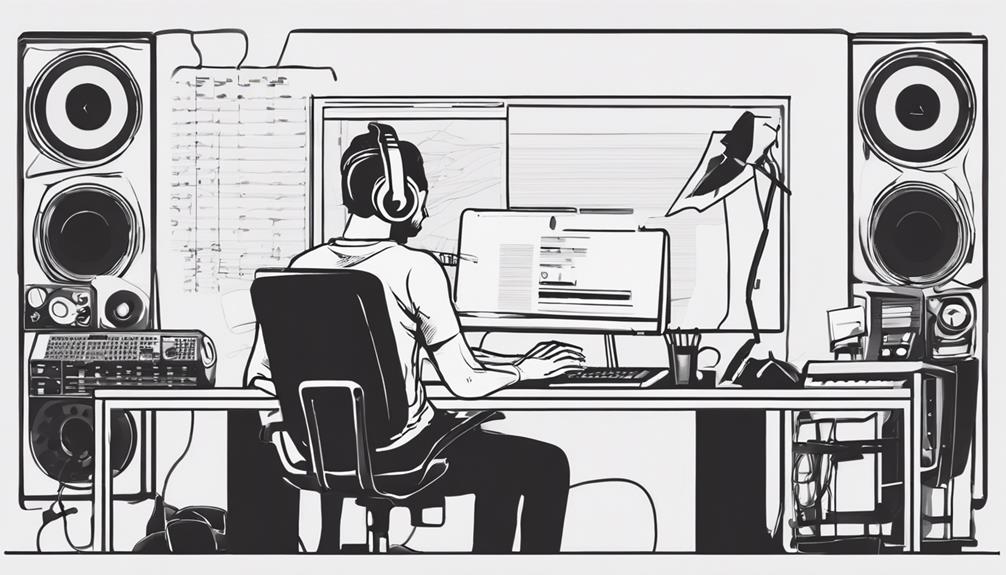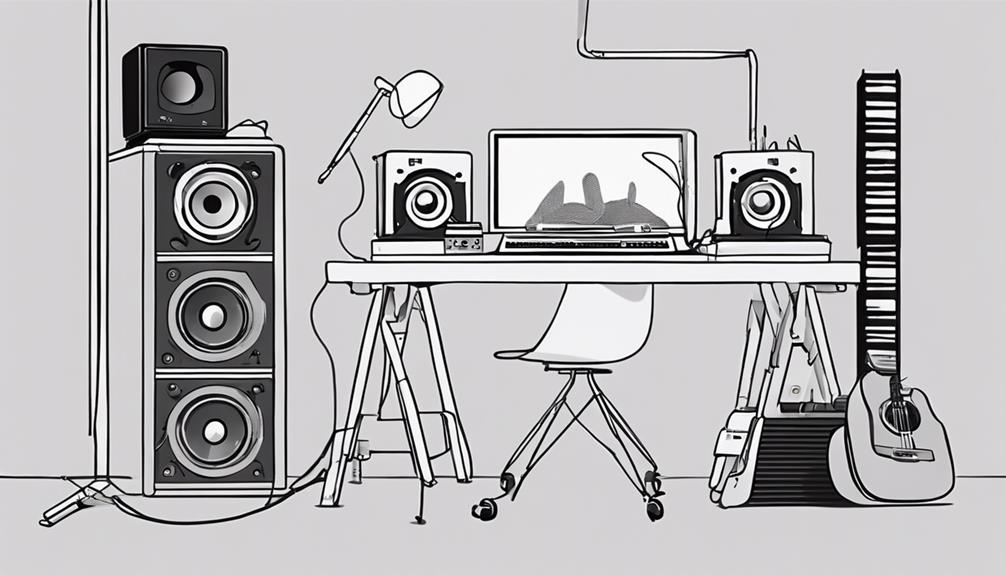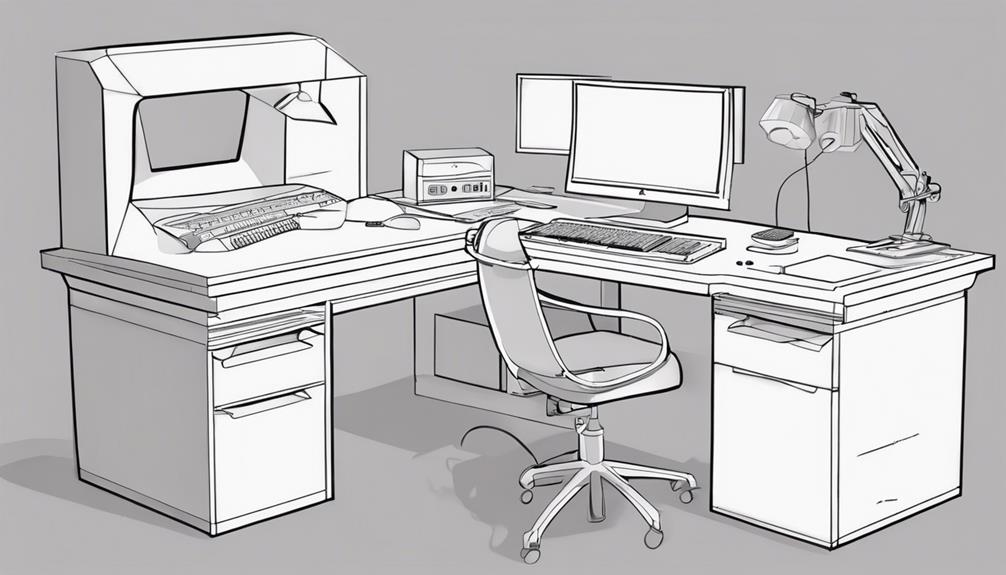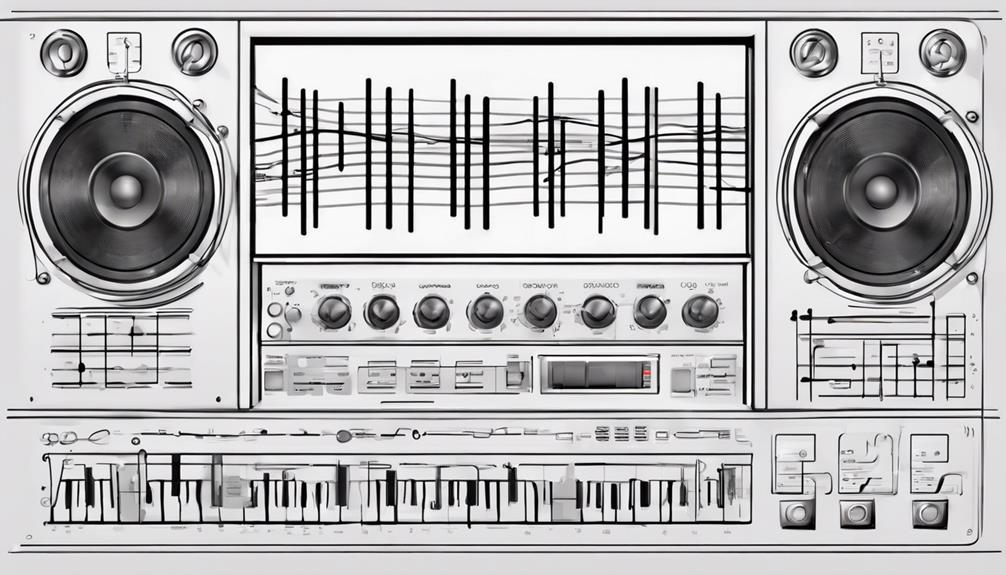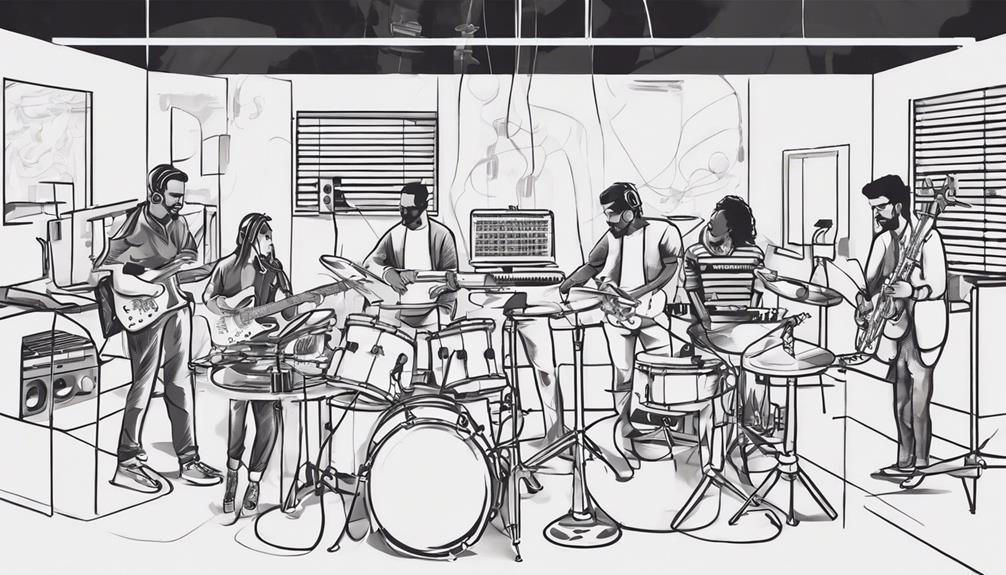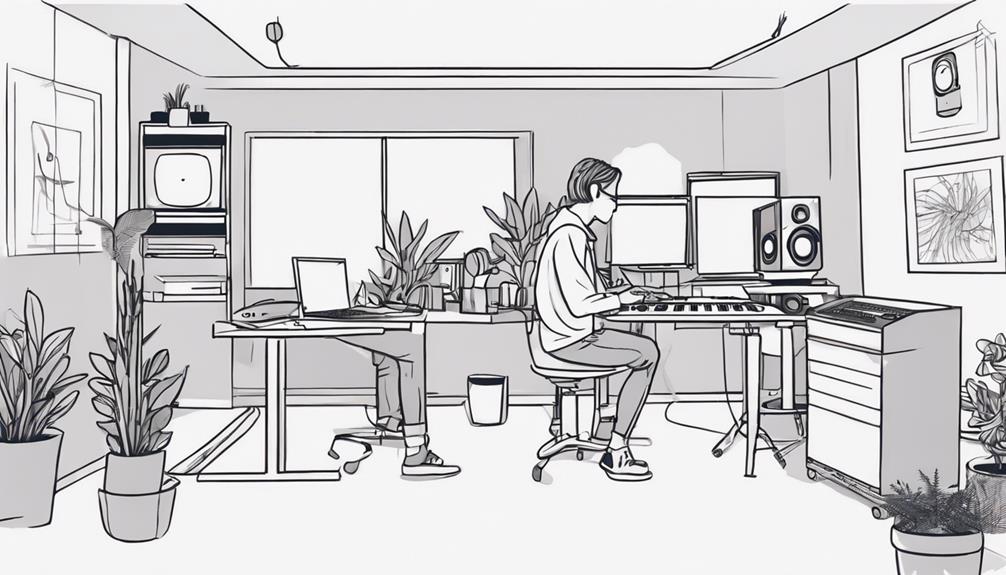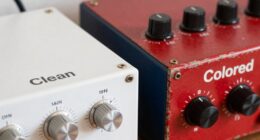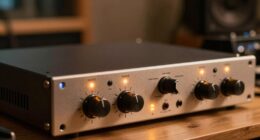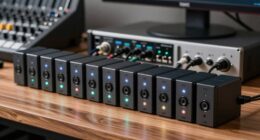To begin music production, grab a high-performing computer, DAW software, audio interface, midi keyboard, and quality headphones. Set up your studio with acoustic panels, bass traps, and cloud panels strategically. Choose the right DAW by mastering tools, considering preferences, and experimenting with free trials. Train your ears through immersion, critical listening, and blind tests while limiting visual dependence. Seek inspiration from industry standards using reference tracks, boosting creativity, and setting quality benchmarks. Each step is vital to launch your music production journey successfully.
Key Takeaways
- Invest in essential equipment like a computer, DAW software, and audio interface.
- Learn about acoustic treatment for your studio to improve sound quality.
- Choose the right DAW based on tools, ease of use, and plugin compatibility.
- Train your ears and eyes through critical listening and blind tests.
- Find inspiration from industry standards and reference tracks for creativity.
Essential Equipment for Music Production
When beginning in music production, you must make sure you have essential equipment to set up your home studio effectively. Key items include:
- A high-performing computer, which serves as the central hub for running your DAW software and processing audio.
- DAW software, an essential tool for creating, editing, and producing music tracks.
- An audio interface, like a 2 in/2 out model, is essential for connecting microphones and instruments to your computer for recording purposes.
- A 25-key MIDI keyboard is a valuable tool for playing virtual instruments and crafting melodies within your DAW.
- Quality headphones are important for accurate monitoring and mixing of your audio tracks.
- Studio monitors offer a flat frequency response, aiding in precise sound reproduction and mixing within a studio environment.
- Microphones and virtual instruments are also crucial for capturing and creating sounds in your music productions.
Ensuring you have these essential tools will lay a solid foundation for your music production journey.
Acoustic Treatment for Your Studio
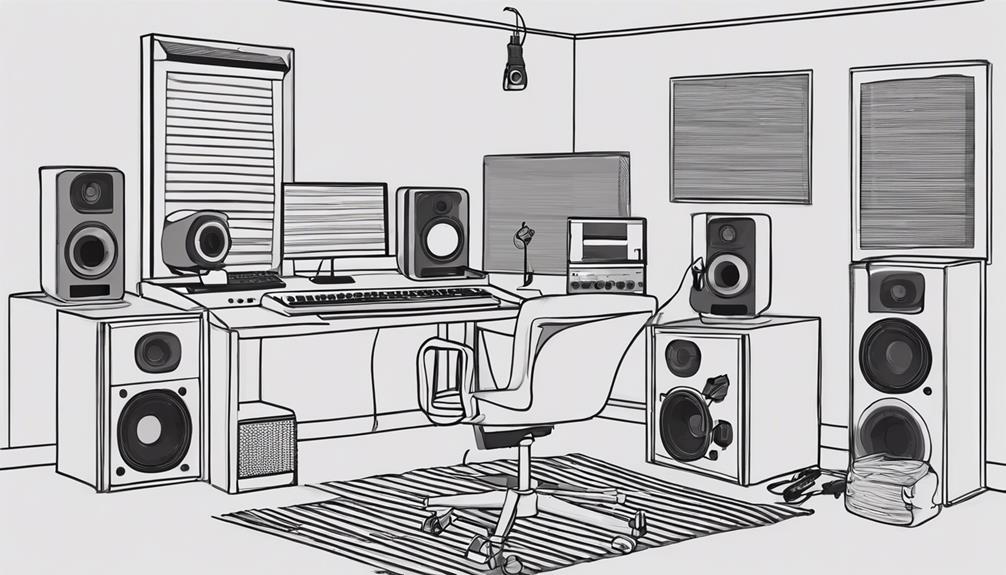
Implementing effective acoustic treatment in your studio is essential for optimizing sound quality and minimizing unwanted audio reflections. To enhance your studio's acoustics, consider the following:
- Acoustic Panels: These are great for absorbing mid and high frequencies, helping to reduce echoes and create a more balanced sound environment in your studio.
- Bass Traps: Targeting low-frequency sound waves, bass traps can greatly improve the clarity of your recordings by minimizing unwanted bass buildup.
- Cloud Panels: Suspended from the ceiling, cloud panels are effective in reducing ceiling reflections, leading to a more controlled and professional acoustic space.
- Strategic Placement: Properly positioning acoustic treatment materials can help combat issues like standing waves and flutter echoes, ensuring a polished and high-quality sound in your recordings.
Choosing the Right DAW
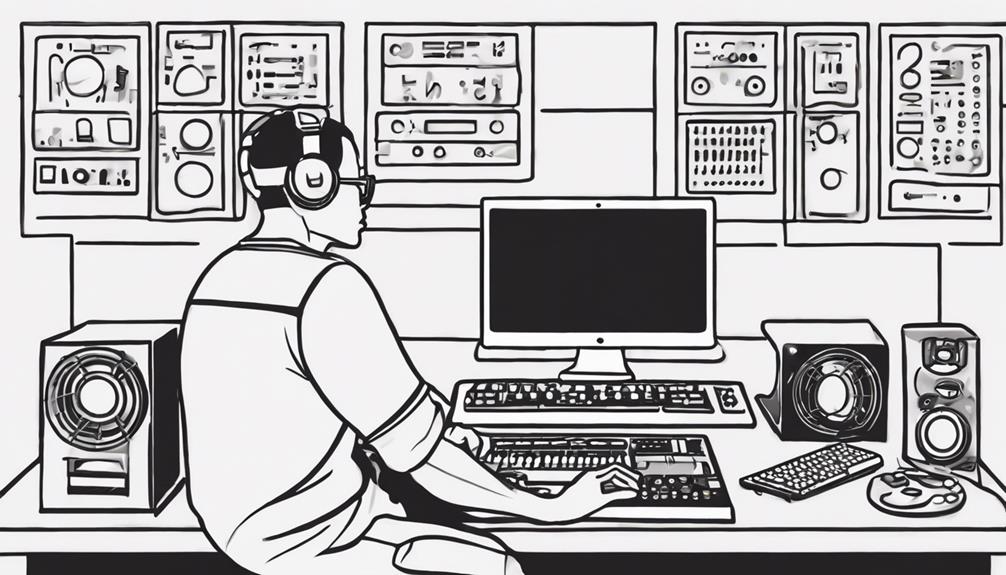
To optimize your music production workflow, selecting the right Digital Audio Workstation (DAW) is crucial for composing, recording, and mixing your tracks effectively. As a beginner in music production, choosing the right DAW can significantly impact your overall experience. When deciding on a DAW, consider your preferences and the features that align with your workflow.
Focus on mastering the tools and capabilities of your chosen platform rather than getting caught up in comparing different options. Factors such as ease of use, included features, plugin compatibility, and cost should all be taken into account when selecting the right DAW for you.
Popular options like Ableton Live, Logic Pro, FL Studio, Pro Tools, and Studio One offer unique features tailored to different needs. It's important to experiment with various DAWs using free trials or demos to find the one that best suits your workflow and music production style.
Training Your Ears and Eyes
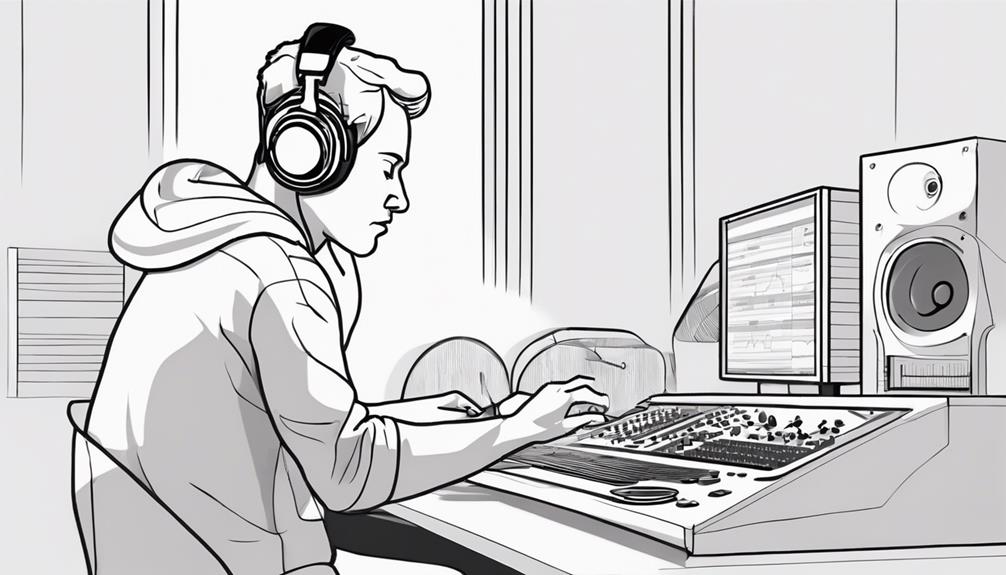
To enhance your music production skills effectively, focus on training your ears and eyes for a more discerning approach to sound perception and analysis. Here are some essential tips to help you improve your auditory skills and make informed creative decisions:
- Immerse Yourself: Immerse yourself in various music genres to develop a sharp sense of sound perception.
- Practice Critical Listening: Analyze tracks for mixing nuances, EQ, and dynamics to enhance your production abilities.
- Limit Visual Reliance: Prioritize honing your auditory skills over visual aids for better decision-making.
- Engage in Blind Tests: Experiment with blind listening tests to identify subtle differences in sound quality and production techniques.
Seeking Inspiration From Industry Standards
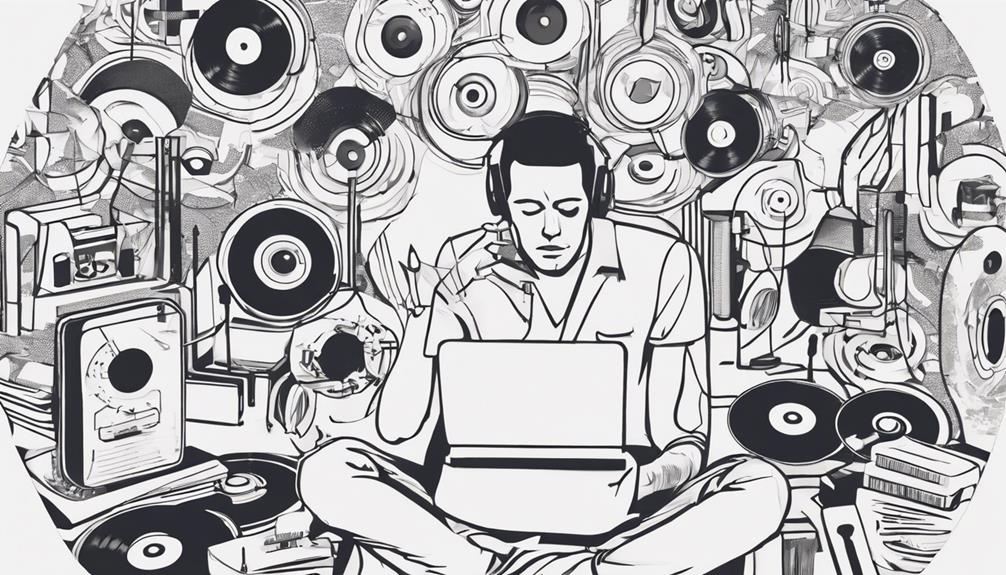
When starting out in music production, looking at industry standards can be a great source of inspiration.
By analyzing popular tracks, you can learn about different production techniques and genre-specific elements.
Using these reference tracks can help you set quality benchmarks and guide your creative process.
Industry Influences for Inspiration
By analyzing industry-standard music, you can gain valuable insights into genre-specific elements and production techniques. Drawing inspiration from established industry influences can greatly impact your music production journey.
Here's how industry influences can inspire and guide your creative process:
- Reference Tracks: Use reference tracks as a roadmap to infuse your personal style while creating a unique sound.
- Creativity Boost: Industry standards can spark creativity and push you to experiment with different techniques to stand out.
- Signature Sound: Studying industry trends helps in developing a signature sound that sets you apart from the crowd.
- Quality Benchmarks: Analyzing successful tracks sets quality benchmarks for your production, elevating the appeal and professionalism of your music.
Embracing industry influences not only refines your skills but also paves the way for you to carve your niche in the music production landscape.
Setting Creative Boundaries
Seeking inspiration from industry standards can serve as a foundation for setting creative boundaries in your music production journey. By analyzing industry-standard music, you can grasp genre-specific elements and production techniques to incorporate into your own work.
Utilizing reference tracks as guidelines enables you to infuse your personal style while aiming for originality. It's vital to blend genre standards with your creative vision to craft a unique sound that stands out.
Industry standards not only act as a benchmark for quality and production techniques but also help shape your creative vision and style. Drawing inspiration from established norms in the music industry can guide you in exploring the vast landscape of music production.
Developing Your Unique Style
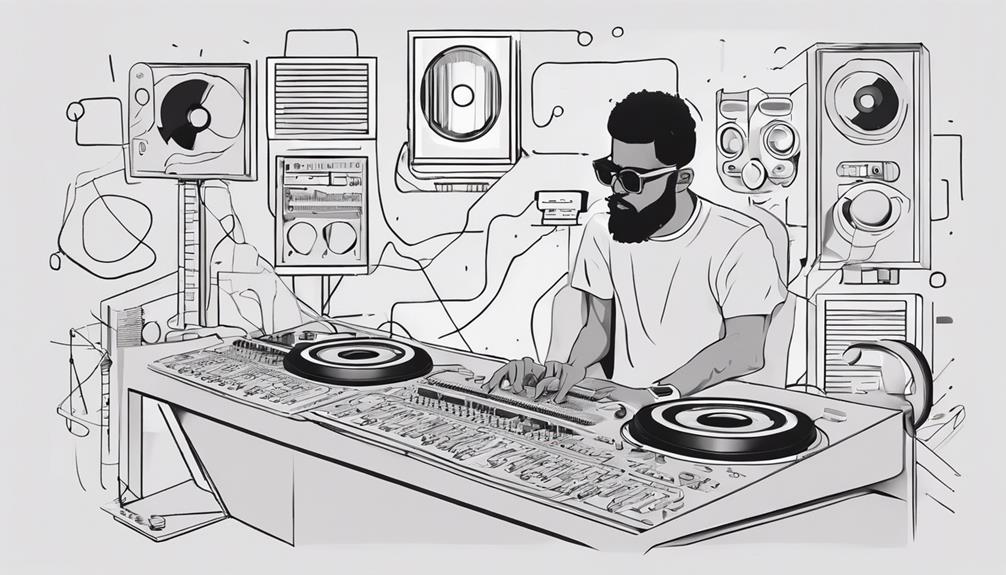
To develop your unique style in music production, experiment with different genres, sounds, and techniques. Incorporate personal influences, experiences, and emotions into your music to make it distinct and authentic. Study the works of your favorite artists and producers to understand their styles and techniques, then adapt them to create your own signature sound.
Don't be afraid to break traditional rules and boundaries in music production to showcase your creativity and individuality. Continuously refine and evolve your style by seeking feedback, experimenting with new ideas, and staying true to your artistic vision.
Frequently Asked Questions
How Do Beginners Start Producing Music?
To start producing music as a beginner, begin by investing in essential gear like a computer, DAW software, and more. Learn music theory basics, experiment with genres, seek feedback, and practice regularly. You'll grow and improve with dedication. Additionally, explore online resources, tutorials, and communities to gain insightful tips about how to start music production and refine your craft. Don’t be afraid to make mistakes, as they’re a crucial part of the learning process. Over time, you’ll develop your unique style and gain the confidence to share your music with a wider audience.
How Do I Start Myself as a Music Producer?
Ready to immerse yourself as a music producer? Begin by investing in essential gear and familiarizing yourself with your DAW. Experiment, collaborate, and stay inspired. Your unique sound awaits – get started and create!
Can I Teach Myself Music Production?
You can absolutely teach yourself music production. Online resources, tutorials, and practical experimentation are valuable tools. Take advantage of built-in guides in DAW software. Engage with online communities for feedback and support. Your journey starts now.
How to Start Music as a Beginner?
To start music as a beginner, research and choose a suitable Digital Audio Workstation (DAW), invest in essential gear, learn basic music theory concepts, watch tutorials, and experiment with different genres to find your unique sound.
Conclusion
Now that you have all the essential equipment, software, and knowledge to start your music production journey, the only thing left to do is immerse yourself and get creative!
Remember, every great producer started as a beginner just like you. So, trust in your abilities, keep learning, and never stop experimenting.
Who knows, the next big hit could be just a few clicks away. Good luck and happy producing!

